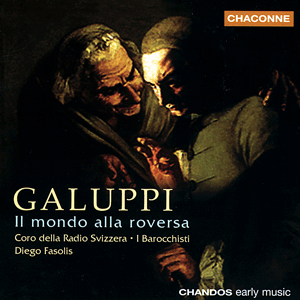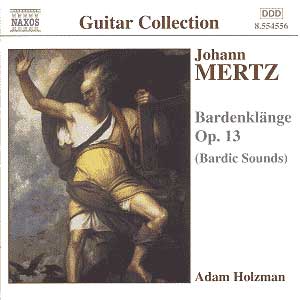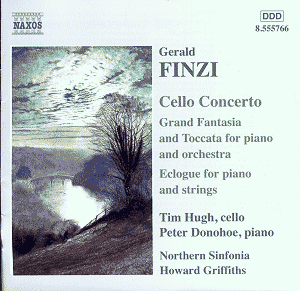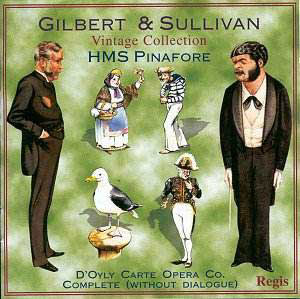 Composer: Baldassare Galuppi
Composer: Baldassare Galuppi
Works: Il Mondo alla Roversa (The World turned Topsy-Turvy)
Performers: Marinella Pennicchi (sop) (Tulia), Rosa Dominguez (mezzo) (Aurora), Mya Fracassini (mezzo) (Cintia), Lia Serafini (sop) (Rinaldino), Furio Zanasi (bar) (Graziosini), Fulvio Bettini (bar) (Giacinto), Davide Livermore (ten) (Ferromonte)
Recording: Swiss Radio Choir, I Barocchisti/Diego Fasolis, Stelio Molo Auditorium, Lugano, Switzerland, Nov 1998
Label: Chandos
Baldassare Galuppi, a pivotal figure in the development of opera buffa, provides a fascinating lens through which to explore the evolution of comic opera in the 18th century. His work, Il Mondo alla Roversa, first staged in Venice in 1750, exemplifies the union of music and comedic narrative that he developed in collaboration with playwright Carlo Goldoni. This burlesque drama cleverly subverts gender roles within its plot, set on an island ruled by women, thus reflecting the societal tensions of its time. The work reveals Galuppi’s sophisticated grasp of melody, harmony, and orchestration, despite musicologist Edward Dent’s assertion that his melodies may not be strikingly original.
The performance under Diego Fasolis and the ensemble of I Barocchisti is marked by a commendable clarity and vigor. Fasolis expertly navigates the orchestral textures, allowing the lively character of the score to emerge with both precision and warmth. The ensemble’s articulation is particularly noteworthy, with the strings and winds engaging in a lively dialogue that complements the vocal lines without overwhelming them. The orchestra’s sound is well-balanced and contributes to the overall buoyancy of the performance, a hallmark of chamber operatic interpretations that respects both the instrumentation and the singers.
Vocally, the cast demonstrates a remarkable understanding of the stylistic demands of Galuppi’s score. Marinella Pennicchi shines as Tulia, showcasing a pure timbre and a secure upper register that delights the ear, while her trills add an expressive flourish to her arias. Rosa Dominguez as Aurora and Mya Fracassini as Cintia present a compelling contrast, with Fracassini’s darker mezzo voice providing a rich depth in ensemble moments, effectively differentiating her character’s motivations from those of the lighter-voiced Dominguez. The men’s roles, particularly those of Furio Zanasi and Fulvio Bettini, are executed with agility; however, the occasional overlap in timbre can lead to moments of confusion regarding character identities, a challenge in cast selection that is common in works of this era.
The recording quality warrants special mention, adhering to Chandos’s well-established reputation for sonic excellence. The sound is both airy and intimate, capturing the nuances of the performance within the natural acoustic of the Lugano auditorium. This clarity allows for a close listening experience that reveals the intricate interplay between singers and orchestration, enhancing the listener’s engagement with the narrative’s comedic subtleties.
Within the context of Galuppi’s oeuvre, this recording stands as a significant document of his contributions to the opera buffa genre. The combination of a thoughtfully curated cast and Fasolis’s adept direction results in a performance that is both lively and insightful. This interpretation of Il Mondo alla Roversa not only honors Galuppi’s innovative spirit but also invites listeners to appreciate the complexities and charm of his music. The ability to maintain dramatic momentum while balancing the comedic elements is a testament to the performers’ skill and the director’s vision.
This release is a valuable addition to the discography of Galuppi’s works, offering a vivid portrayal of a composer who, while perhaps overshadowed by his more famous contemporaries, played a crucial role in shaping the trajectory of the operatic form.



